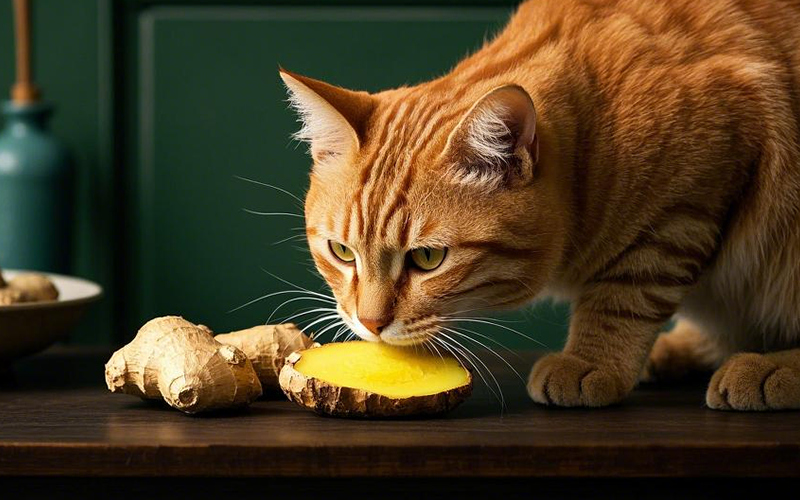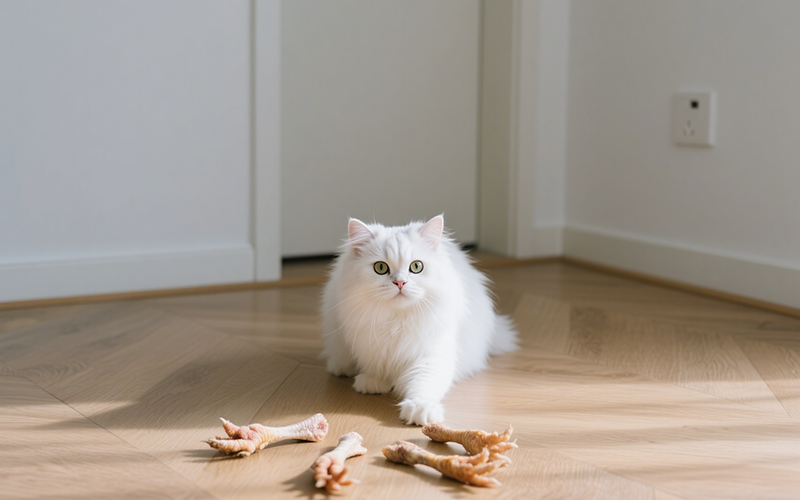Can Cats Eat Ginger? A Guide to Offering Spices Safely to Your Cat
- 1 Mar 2025 11:24
As a cat owner, you might wonder if certain spices like ginger can be safely shared with your feline companion. Ginger is a popular root known for its medicinal properties in humans, but can it benefit or harm cats? Let's dive into whether cats can eat ginger, its potential health benefits, and any risks involved.

What is Ginger?
Ginger (Zingiber officinale) is a flowering plant commonly used as a spice in cooking and for its health benefits in humans. It has a strong, aromatic flavor and is known for its anti-inflammatory, antioxidant, and digestive properties. Many people use ginger to soothe upset stomachs, improve circulation, and reduce nausea.
Can Cats Eat Ginger?
While ginger is not toxic to cats, it’s important to be cautious about feeding it to them. Cats have different digestive systems than humans, and while small amounts of ginger might not cause immediate harm, it’s not a food that is typically part of their natural diet.
Here’s what you need to know about giving ginger to your cat:
Potential Benefits of Ginger for Cats
✔ Digestive Aid – In humans, ginger is often used to relieve nausea and improve digestion. Some people believe that ginger might have similar benefits for cats, helping to soothe an upset stomach or alleviate symptoms of motion sickness.
✔ Anti-Inflammatory Properties – Ginger contains gingerols, compounds that have anti-inflammatory effects. This could theoretically help reduce inflammation in cats with certain conditions, such as arthritis or digestive issues.
✔ Natural Remedy for Hairballs – Some cat owners use ginger to help manage hairballs. Although there’s limited evidence to support this, a small amount of ginger might help improve digestion and prevent hairball build-up.
Risks of Feeding Ginger to Cats
While there are potential benefits, there are also some risks associated with giving ginger to your cat:
❌ Digestive Upset – Cats have delicate digestive systems, and too much ginger can irritate their stomachs. If you give your cat too much ginger, it could lead to vomiting or diarrhea.
❌ Too Strong for Cats – Ginger has a very strong, spicy flavor that can be overwhelming for cats. Their taste buds are different from ours, and they might not tolerate the strong taste.
❌ Medication Interactions – Ginger might interfere with certain medications your cat is taking. If your cat is on medication for a chronic condition (like blood thinners), it's important to consult your vet before introducing ginger or other spices into their diet.
❌ Allergic Reactions – Although rare, some cats might have allergic reactions to ginger. If your cat shows signs of a rash, swelling, or difficulty breathing, stop giving ginger immediately and consult your vet.
How to Safely Serve Ginger to Cats
If you decide to offer ginger to your cat, it’s important to do so safely and in small amounts. Here’s how:
✅ Moderation is Key – Ginger should only be offered in small, controlled amounts. A tiny piece of ginger or a sprinkle of ginger powder in your cat’s food should suffice.
✅ Fresh or Dried Ginger – You can offer your cat small pieces of fresh ginger, or a pinch of dried ginger powder. Avoid ginger products with added sugar, artificial sweeteners, or other ingredients that could be harmful to your cat.
✅ Monitor for Adverse Effects – After giving your cat ginger, monitor them for any signs of digestive upset, such as vomiting or diarrhea. If any symptoms occur, stop offering ginger and consult your vet.
✅ Avoid Ginger Supplements – Don’t give your cat ginger supplements, such as pills or concentrated extracts, unless directed by your vet. These products can be too strong and could cause harm to your cat.
Can Kittens Eat Ginger?
It’s best to avoid giving ginger to kittens, as their digestive systems are still developing, and introducing unfamiliar foods like ginger could cause gastrointestinal distress. Stick to kitten-formulated food until your cat is older.
Healthier Treat Alternatives for Cats
If you’re looking for other safe treats for your cat, consider the following options:
✅ Cooked Meat – Small pieces of cooked chicken, turkey, or beef are great, high-protein options that most cats love.
✅ Catnip – For mental stimulation and fun, offer your cat some fresh catnip or catnip toys. These are natural, safe, and can provide enrichment.
✅ Pumpkin – A small amount of pure pumpkin can help with digestion and hairballs, making it a great, safe treat for cats.
✅ Cooked Eggs – Scrambled or boiled eggs are rich in protein and often enjoyed by cats.
Final Verdict: Can Cats Eat Ginger?
While ginger is not toxic to cats, it should only be given in moderation and with caution. Small amounts of ginger might offer some potential health benefits, such as aiding digestion or reducing inflammation. However, due to its strong flavor and potential for digestive upset, ginger should never be a regular part of your cat’s diet.
If you’re unsure about introducing ginger or any new food to your cat’s diet, or if your cat is experiencing digestive issues, consider using PettureX, an AI-powered pet health assistant. PettureX offers 24/7 consultations to help you make the best choices for your cat’s health and well-being.
Related

Can Cats Eat Egg Yolk Raw? A Vet's In-Depth Guide to Feline Nutrition & Safety
- 10 Jun 2025
Can Cats Eat Dog Kibble? Unpacking the Nutritional Mismatch!
- 29 May 2025
Can Cats Eat Deli Turkey? Slicing Through the Facts for Your Feline!
- 29 May 2025
Can Cats Eat Deer Meat? Exploring Venison for Your Feline!
- 28 May 2025
Can Cats Eat Corned Beef? Unpacking This Salty Human Delicacy!
- 28 May 2025
Can Cats Eat Cooked Rice? The Grain Truth for Your Feline Friend!
- 27 May 2025
Can Cats Eat Cornbread? A Crumb of Truth for Curious Cat Owners!
- 27 May 2025
Can Cats Eat Cooked Meat? Sizzling Facts for Your Feline's Feast!
- 26 May 2025
Can Cats Eat Chili? Spicing Up the Truth About This Human Dish!
- 26 May 2025
Can Cats Eat Chicken Feet? A Paw-sitive or Negative Treat?
- 24 May 2025
